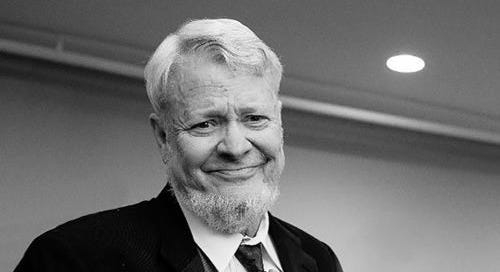In Memoriam
My issue today will be shorter than usual, but I hope you will understand and forgive me—today I was saying goodbye to an old friend.
Ernesto Hernandez-Cata worked for the International Monetary Fund (IMF) for 30 years and was head of the first IMF negotiation mission in Moscow from 1992 to 1995 after Russia joined the organization. A Cuban by nationality, born in Havana, Cuba, Ernesto grew up in Geneva, Switzerland, where his father worked at the International Telecommunication Union.
Ernesto had a dream—to come home and change his native country for the better. But it didn’t happen: He spent his entire adult life in Washington, D.C., working for the IMF, the Federal Reserve, Johns Hopkins University, and The American University. He followed closely what was happening in his country until his last days and hoped.
Ernesto was my counterpart in the negotiations I conducted while working at the Ministry of Finance and became my friend and teacher. He taught me how to prepare and strategize for talks; he showed me that success in negotiations is not about crushing your opponent but about compromising; and he showed me that the path to success in negotiations is when you understand your opponent’s interests and find a way to meet them. These lessons came in handy over the years that followed, and every time I sit down to negotiate, I think of Ernesto.
When I moved to Washington, D.C., Ernesto was one of the first people I connected with there and with whom I had regular contact. The last time we exchanged emails was after the Ukraine war started, and we agreed to meet when things calmed down. But it was not meant to be. Ernesto passed away 11 days short of his 80th birthday, which would have been today.
Rest in peace.
Sanctions do not bother
A May poll by the Levada Center showed that Russians’ concern about Western sanctions had declined slightly in all response categories. The first shock of the sanctions has passed.
If you want, you can see a slightly higher level of anxiety among residents of large cities, including Moscow (43%-45%) and respondents with low incomes (41%). Still, the differences with other categories of respondents are not so great to consider them significant.
Compared to March, the proportion of respondents who noted that the sanctions did not create problems for them and their families increased significantly: From 30% in March to 50% in May. This growth occurred at the expense of a substantial decrease in the share of those who believe that the sanctions have created severe problems (from 22% to 11%) and those for whom the sanctions have not made severe problems (from 39% to 33%).
Most respondents (74%) believe that the West is trying to weaken Russia by imposing sanctions. Not surprisingly, three-quarters of Russians believe that Russia should continue its policy despite the sanctions, and only 19% say a compromise is needed.
Budget is strong but the economy?
The Russian Finance Ministry has published its preliminary five-month budget execution report. Most experts cited the lack of a breakdown of expenditures by individual items as the main thing. This should come as no surprise after the Bank of Russia has classified the reports of banks, the Federal Customs Service has classified information on exports and imports, and the Energy Ministry has classified information on oil extraction, exports, and refining. Tell me, why should the Finance Ministry, in this situation, continue to publish information on budget expenditures, which makes it possible to see how much the war is costing Russia? A bit strange, of course, is the Ministry of Finance’s comment about the need to minimize the risks of new sanctions being imposed against Russia.
Due to the pressure exerted by the U.S., EU, UK, and other unfriendly states on the Russian Federation and individuals, there was a need to partially restrict the dissemination of information, including on the formation of budget reporting.
For me, however, the most important was the information from the Ministry of Finance on the collection of VAT (not including imports), which hints at the beginning of a severe economic downturn. Receipts of this tax for the first three months were 21.8% higher than a year ago, which is in line with the Ministry of Economy’s estimate of GDP dynamics in the first quarter (1.6% growth over last year, considering the 20% deflator). In April-May, the collection of this tax was 1.5% less than last year in nominal terms (without adjusting for inflation). Application of the 20% deflator suggests a decrease in VAT revenues by 18% in real terms. Such an estimate of the decline looks excessively large, but even if a factor of 3-4 reduces it, we can talk about a 5%-6% decline in the economy in the second quarter.
I suggest treating this estimate cautiously, realizing that Rosstat’s data on May results and the Finance Ministry’s budget execution in June might force a correction. However, I would not dismiss it either.
Oil export is in good shape?
The Finance Ministry report made me question the credibility of the talks about a substantial decline in oil exports from Russia. Budget tax revenues associated with oil and gas production and exports correlate very closely with the dynamics of the Urals oil price, expressed in rubles. If oil and petroleum product exports from Russia declined by at least 5%, oil and gas tax receipts should have been noticeably lower.
More on this issue tomorrow.







Very nice comment Sergey. Ernesto was my first boss at the Fund, and I learned a lot from him.
Thank you for this, and for being a friend and cherished colleague. Isabel Hernandez-Cata